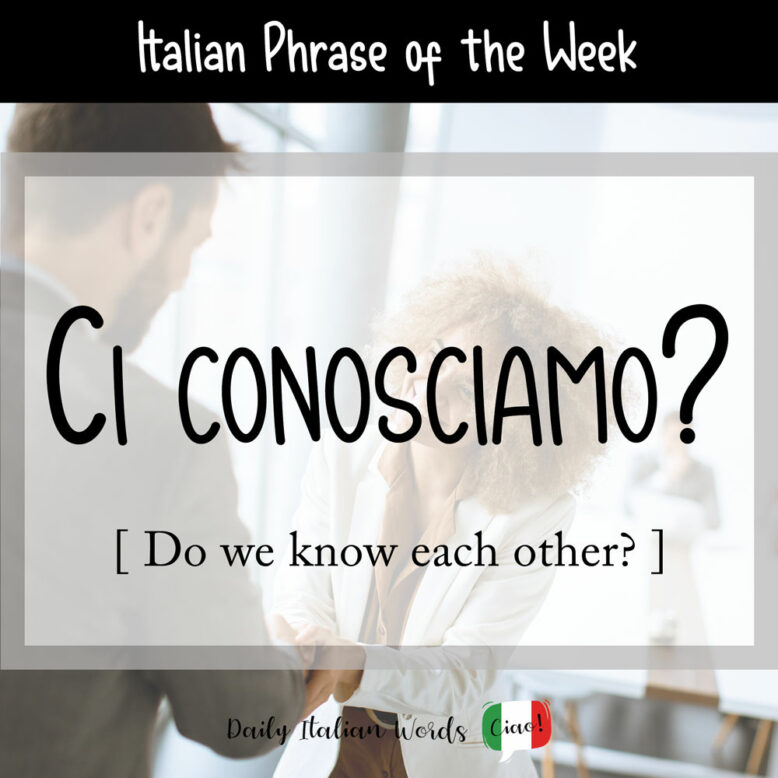There are many reasons you might vaguely recognise someone but fail to remember their name or how you happen to know them. Perhaps you haven’t seen that person for many years, or you’ve spotted them out of context and can’t put a name to a face. No matter the situation, a useful phrase you can use in Italian to confirm your suspicions about a person’s identity is Ci conosciamo? which means Do we know each other?
Ci conosciamo?
Do we know each other?

The verb conoscere which means ‘to know‘ in the sense of being acquainted or familiar with someone or something. Because we are talking in the first-person plural, we need to use the conjugated form conosciamo (we know).
Then we have ci. This word has multiple meanings in Italian, but in this specific case, it is the first-person plural reflexive pronoun whose equivalent in English is ‘ourselves‘ or ‘each other‘. Instead of saying “we know each other“, you have to swap the word order in Italian (literally “each other we know“).
Non ci conosciamo molto bene.
We don’t know each other very well.
Se ci frequentiamo più spesso, ci conosceremo meglio.
If we see each other more often, we will get to know each other better.
Important: A verb that also translates as ‘to know‘ in Italian is sapere, but it is never used to state that you know a person. Sapere means ‘to know’ in the sense of ‘being aware’, ‘knowing (how to do something)’ and even ‘hearing (about something)’.

Quite often people will place the adverbs già (already) or per caso (by any chance) at the end of the sentence, or begin with softening words such as Ma… (literally ‘but‘ but in this case it is closer in meaning to ‘umm’), the formal Scusi… (I’m sorry / Excuse me…) or the informal Scusa (Sorry…).
Scusa, ma per caso ci conosciamo?
Sorry, but do we know each other by any chance?
Some other popular ways of posing the same question include:
- Ci siamo già incontrati? = Have we already met?
- Ci siamo già visti? = Have we already met? (lit. Have we already seen each other?)
Note that in English, we often use the phrase “Do I know you?” but in Italian, it sounds somewhat unnatural to say “La conosco?” (Do I know you? – formal) or “Ti conosco?” (Do I know you? – informal).
Ma, ci siamo già incontrati, vero? – Sì, alla festa di Mauro il mese scorso!
Umm, we’ve already met, haven’t we? – Yes, at Mauro’s party last month!

One additional expression is the colloquial Ma chi ti conosce?! (literally: But who knows you?!). Italians use it to indicate they’re not interested in what somebody has to say, and it is often accompanied by phrases such as Lasciami stare! (Leave me alone!) or Sparisci! (Get lost!)
Scusa, mi puoi dare il tuo numero? – Ma chi ti conosce!? Vattene, va!
Sorry, can you give me your number? – Who the heck are you? Get lost!
Heather Broster is a graduate with honours in linguistics from the University of Western Ontario. She is an aspiring polyglot, proficient in English and Italian, as well as Japanese, Welsh, and French to varying degrees of fluency. Originally from Toronto, Heather has resided in various countries, notably Italy for a period of six years. Her primary focus lies in the fields of language acquisition, education, and bilingual instruction.


